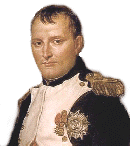| ||||||||||||||||||||||||||||||||||||||||||||||||||||||||||||||||
|
A truly dramatic moment in history occurred on April 20, 1814, as Napoleon Bonaparte, Emperor of France and would-be ruler of Europe said goodbye to the Old Guard after his failed invasion of Russia and defeat by the Allies. By that time, Napoleon had ruled France and surrounding countries for twenty Napoleon built a 500,000 strong Grand Army which used modern tactics and improvisation2 in battle to sweep across Europe and acquire an Empire for France. But in 1812, the seemingly invincible3 Napoleon made the fateful decision to invade Russia. He advanced deep into that vast country, eventually reaching Moscow in September. He found Moscow had been burned by the Russians and could not support the hungry French Army over the long winter. Thus Napoleon was forced to begin a long retreat, and saw his army decimated to a mere4 20,000 men by the severe Russian winter and chaos in the ranks. England, Austria, and Prussia then formed an alliance with Russia against Napoleon, who rebuilt his armies and won several minor5 victories over the Allies, but was soundly defeated in a three-day battle at Leipzig. On March 30, 1814, Paris was captured by the Allies. Napoleon then lost the support of most of his generals and was forced to abdicate6 on April 6, 1814. In the courtyard at Fontainebleau, Napoleon bid farewell to the remaining faithful officers of the Old Guard...
Following this, Napoleon was sent into exile on the little island of Elba off the coast of Italy. But ten months later, in March of 1815, he escaped back into France. Accompanied by a thousand men from his Old Guard he marched toward Paris and gathered an army of supporters along the way. Once again, Napoleon assumed the position of Emperor, but it lasted only a 100 days until the battle of Waterloo, June 18, 1815, where he was finally defeated by the combined English and Prussian armies. A month later he was sent into exile on the island of St. Helena off the coast of Africa. On May 5, 1821, the former vain-glorious Emperor died alone on the tiny island abandoned by everyone. In 1840 his body was taken back to France and buried in Paris. 点击  收听单词发音 收听单词发音
|
||||||||||||||||||||||||||||||||||||||||||||||||||||||||||||||||
- 发表评论
-
- 最新评论 进入详细评论页>>

 years. Originally an officer in the French Army, he had risen to become Emperor amid the political
years. Originally an officer in the French Army, he had risen to become Emperor amid the political 

